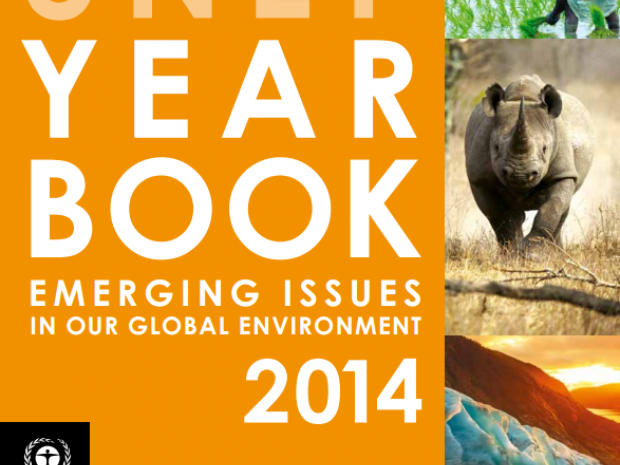UNEP YEAR BOOK 2014: EMERGING ISSUES IN OUR GLOBAL ENVIRONMENT

Publication Date: 2014
Ten years after the first Year Book in this series appeared, a special e-book anniversary edition – UNEP Year Book 2014 – presents a fresh look at ten issues highlighted over the past decade. This UNEP Year Book 2014 takes advantage of the latest technology, providing a multi-media experience that helps illustrate the environmental challenges we face today and some of the innovative solutions that have been created to solve those challenges. Video, animations, data visualization and stunning images from around the world help tell the stories.
Follow this link to the UNEP Year Book 2014: http://www.unep.org/yearbook/2014/
Foreword by Achim Steiner:
Ten years ago UNEP alerted the world to the development of dead zones in coastal waters resulting from excess nitrogen seeping into the water. That was in the first edition of the Year Book series. In the intervening period many more emerging issues have been identified, with some rising to crisis level and others showing encouraging improvement.
The 2014 Year Book shows how scientific endeavour and policy actions have led to innovative solutions and vital advancements. Yet these are frequently outpaced by overall economic growth. For example, as the fuel efficiency of cars has increased, the size of the vehicle fleet continues to grow. Similarly, as the aquaculture sector expands in response to the demand for food, scientists expect that its environmental impacts may double by 2030. For the illegal wildlife trade, a state of crisis has been reached, with the world standing to lose two iconic species as a result of the demand for ivory and rhino horn if no urgent action is taken.
The 2014 Year Book reconfirms the critical role that the environment plays in maintaining and improving the health of people and ecosystems: from the well-managed soils and nutrients that underpin food production to the critical role of biodiversity in protecting human health against the spread of infectious diseases. Clean air in our cities prevents the premature death and illness of millions of people and can save society trillions of dollars.
Our economies are still largely fossil-fuel based, with the environmental, economic and health costs largely hidden. For example, in the pristine polar regions, scientists have recently found tiny pieces of plastic trapped in sea ice. Transported by ocean currents across great distances, these contaminated particles eventually become a source of chemicals in our food. The key of course is to prevent plastic debris from entering the environment in the first place.
The issues in the 2014 Year Book have clear connections. A warmer and wetter climate will cause shifts in the spread of infectious diseases, whilst rapid melting of Arctic glaciers will have far-reaching global implications for sea-level rise and the potential release of methane – a potent greenhouse gas. Strong action on air pollutants, especially particulate matter – of which black carbon is a component – would result in multiple benefits by not only slowing the melting of polar ice and snow, but also significantly improving human health.
A key message of the 2014 Year Book is that we will increasingly need access to timely, reliable environmental information from locations around the world so that we can identify issues as they emerge and develop effective actions and policies to respond to them. Without this, the global community’s efforts will be hampered. It is for this reason that UNEP is committed to helping countries improve their environmental data flow and to making knowledge much more widely accessible. From new space technologies to social media and citizen science, UNEP is supporting local and indigenous communities to start measuring and providing data themselves. The Year Book itself reflects this change by being launched as a mobile app, richly illustrating the topics with live graphics and video stories about positive initiatives that address existing and emerging issues.
I encourage you to explore the Year Book in its new format and use the 2014 Year Book update to support your own activities in the advancement of sustainable development.
Log in with your EU Login account to post or comment on the platform.